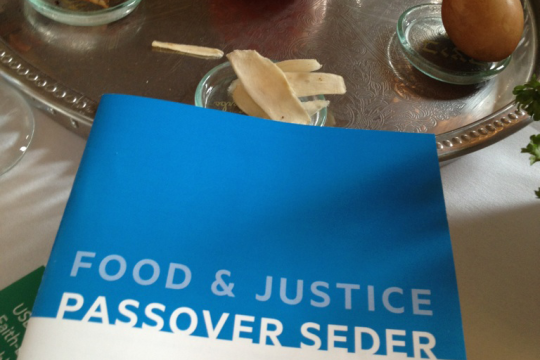by Rabbi David E. Levy
12 years ago, as we prepared to send our long-struggling NFTY chapter off into the sunset, Todd Markley, our Rabbinic Intern, now Rabbi at Temple Beth Shalom in Needham, MA, said: “Mercaz is our Youth Group.” WRT has enjoyed a long history of engaging our teens in our educational program, Mercaz, meaning “Center,” a community hub where our teens can “center” themselves during their over-programmed and often stressed-out lives. We still retain 40% of our teens after B’nei Mitzvah, engaging them in an educational program that includes a range of elective classes including: Jewish Cooking, Holocaust studies, and deep engagement with classical Jewish texts. While this exceeds the Reform Movement’s average (25% retention) for post-B’nei Mitzvah engagement, I believe we can do a lot better, and our present work reflects this hope.
Two years ago, the first night I walked into our Wednesday night program, I was astonished by the sight of 200 teenagers excitedly chattering and enjoying pizza dinner together. Yet, as I came to know our program, I felt that something was missing: our teens were still in many cases passive consumers of their Jewish education. On the whole, there was no opportunity for the teens lead our Mercaz community, or to plan activities on their own. They chose the electives we provided, enjoyed the pizza we ordered, and did it all inside our synagogue. In many ways, our teens were not aware of how many opportunities were out there, just around the corner.
Shortly before this, around four years ago, BBYO became a part of the Westchester community, bursting onto the scene, and expanding to over 200 teens seemingly overnight. Their success was exemplified by the grassroots nature of their program. Lauren Keats, a WRT teen and regional president of B’nai Brith Girls [the women’s chapter] remarked: “BBYO is successful because we [the students] have complete control: we name our organization and we decide what we are going to do.”
We are currently in the midst of a renaissance in Jewish life and learning. For Jewish teens, Westchester county is starting to feel like a big college campus. Incorporating a new BBYO chapter based here, at the temple, is one of the many ways I envision our students taking ownership of their Jewish journey throughout High School. If a teen wants meaningful community service, he or she can join our partner J-Teen Leadership on missions to Cuba or New Orleans. If a teen wants a lunch-and-learn in their school, there’s an organization called Jewish Student Connection that meets in the public High School. If a teen eventually wants to join a Jewish Fraternity or Sorority in college, BBYO is already awaiting their leadership in our in-house boys and girls chapters.
So what is the role of the synagogue in the “multiplex” of compelling local offerings for Jewish teenagers? I return to the word Mercaz, “Center.” Without a hub to organize all the options into a cohesive suite, without a Center for the Jewish youth community, without centralized synagogue leadership directing the path that any individual student might pursue, most teens are likely to feel adrift and choose nothing, preferring disengagement to exploring all the diverse options on their own. At our Center, we have 10 part time youth professionals each striving to create an Individualized Jewish Education Plan (IJEP) for each of our young people after their Bar or Bat Mitzvah. Each professional works with a cadre of teens seeking to create a relationship strong enough that they can really help guide their Jewish future throughout High School.
I am hopeful that our synagogue will remain our youth community’s Jewish home address, the way their Hillel chapter might be a home for them when they go off to college. I want our synagogue to be place for our teens to recharge their spiritual and mental batteries; it should also be a place where we come to know each student well enough to make a thoughtful recommendation that will deepen their engagement: “I think you would blossom at BBYO.” “I think you would really enjoy this service-learning experience with J-Teen.”
So many of our peers fear collaborating with other organizations because we worry about competition or dilution of our own programs. In our experience, embracing collaboration has been the key to our success, because we are all working toward the same goal: ensuring that every one of our young people grows up to be proud, thoughtful, self-respecting Jewish women and men ready to change our world for the better.
Rabbi David E. Levy is the Assistant Rabbi & Director of Youth Engagement at Westchester Reform Temple, Scarsdale, NY.
[[{"type":"media","view_mode":"media_large","fid":"58806","attributes":{"class":"media-image aligncenter size-full wp-image-46873","typeof":"foaf:Image","style":"","width":"568","height":"96","alt":"jye-banner"}}]]
Related Posts
Image

Passover 2024: The Three Central Messages of Pesach
The Exodus story is the master narrative of the Jewish people. As most of us know, it tells the story of the Hebrew slaves in Egypt and the rise of Moses as their liberator. It reminds us that in 2024, the universality of Passover's three-part message again reverberates through the generations: freedom, love, and justice.
Image

Modern-Day Plagues of Injustice and Inequality
On Passover, we recount the Ten Plagues that were inflicted upon the Egyptian people. Here are some of the "plagues" and injustices that afflict our present-day society -- and actions you can take.
Image

Setting Your Leaders Up For Success
It's board nomination season again! Time to compile lists, get recommendations, and start calling the future leaders of your congregation. The URJ has resources, advice, and initiatives to set you and your board up for success.